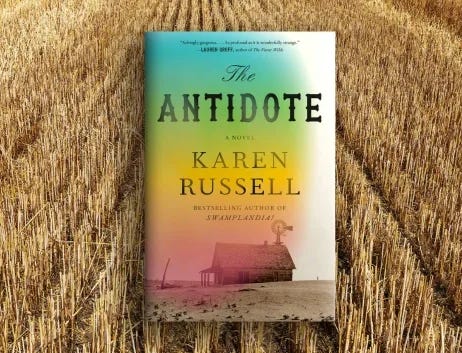My Book Report
By Deidre Depke
Mention The Overstory at your book club, and it’s guaranteed several people will promptly announce: “That book changed my life!” Even Barack Obama, who blurbed the 2018 novel, had this to say: “It changed how I thought about the Earth and our place in it. It changed how I see things.”
Richard Powers’ Pulitzer Prize-winning follows nine Americans united by their determination to save old-growth forests. The characters span generations; their motivations and machinations are genuinely interesting. But Powers’ real aim with Overstory is to educate. Building on The Hidden Life of Trees, the 2016 treatise by Germany’s Peter Wohlleben, Powers makes his own case for the sentience of these plants — detailing how trees communicate, alert each other to danger, and share immune systems. Fans of The Overstory are right: It’s an epic, poetic life-changer.
Given all that, anticipation around Powers’ new novel, Playground, was intense, with group chats declaring, “This one’s about the ocean!” Like Overstory, this 2024 novel is a multi-character story, mixing time periods and narratives. It’s set primarily on a French Polynesian island called Makatea, which in the 20th Century was subjected to destructive phosphate mining and nuclear testing.
And yes, it does spend time drilling you with oceanic truths, noting that these vast bodies of water remain almost completely unexplored, that they are filled with species we know little about — some capable of forming relationships with humans. With nearly three-quarters of the earth covered by these gigantic bodies of water, Powers quotes a science-fiction giant to provide the context: “How inappropriate to call this planet Earth, when clearly it is Ocean,” Arthur C. Clarke once wrote.
Playground is a warning about climate change and our destruction of the planet. But Powers doesn’t stop there. In portentous detail, he takes on the threat to humanity posed by technology, specifically artificial intelligence.
Todd Keane, one of the book’s four major characters, invents a social-media platform while at college, essentially creating that new method of communication. Later in life, Keane invests in AI’s development, even while he acknowledges its ominous potential.
Keane is eventually drawn to Makatea, where he wants to build self-sufficient floating homes for fellow billionaires concerned about end-times. The island engages in a civil discourse about the development plan, with sidetracks into what it means to be a community and the lure of economic development for people making do without much.
Playground is well worth your time. Powers’ attention to plot and character is the assured work of a mature author. Near the end, he surprises with a twist, requiring readers to re-calibrate the insights they’ve drawn from reading the other 90 percent of the novel.
The author sums up his themes nicely: “Ancestors crossed the Pacific without an instrument more powerful than their hollowed-out canoes. Their brains knew all the ways of water and stars…. Now humans can sit on the deck while boats pilot themselves and talk to satellites that measure the rise and fall of sea levels down to single centimeters. All that in only three thousand years. There are strands of black corals as old as that.”
Confronting America’s Brutal Past
The Antidote, by Karen Russell, has one of the most disturbing first two pages of a novel I’ve read. She describes a jack-rabbit slaughter by dust-bowl farmers in the fictional town of Uz, Nebraska. They view the rabbits as a crop nuisance. “A hundred jointed arms come swinging into the pen that is alive with jackrabbits, the place of no escape. Now there is only madness. Terror of cudgels, of ax handles and hammers, terror of being trampled.”
And that’s just the start of Russell’s unsparing epic about life in 1930s rural America. The plot is book-ended by two very real natural disasters. First, the 1935 Black Sunday dust storm, a deadly event in which the sky turned black and the wind created choking deaths. The storm, created by the over-farming of the Great Plains, gave the Dust Bowl its name. At the novel’s end is the Republican River flood, which took place one month after the dust storm. That day, 24 inches of rain fell — with fatal effects.
As in her previous novel Swamplandia, Russell in The Antidote creates a complex ecosystem of characters, mixing plot and fantasy. At the book’s heart is a community trying hard to survive the depression and another cropless year. There are tornadoes and crooked sheriffs and serial killers and the New Deal, which offered failing farmers advice they’d rather not heed.
The novel’s namesake is a “prairie witch,” a “vault” who takes “deposits” of stories from people hoping for absolution — or at least amnesia. As the prairie witch describes it, she listens to “sins and crimes, first and last times, nights of unspeakable horror. It’s rarely the truth itself that people can’t accept. It’s how they feel about it.”
Confronting the truth is an important theme for Russell. The Antidote explores how the creation of vast swaths of the American West depended on the violent wresting of land from Native Americans. That’s a legacy conveniently subsumed by later generations. “We newcomers to the Great Plains were invited out here by the U.S. government to hold ground,” the prairie witch observes. “The Homestead Act, the Dawes Act, all part of a battle plan.”
The Antidote offers a looking glass for all of us; an opportunity to deal honestly with our past, and perhaps, the chaos and violence of the America we’re living in today.




